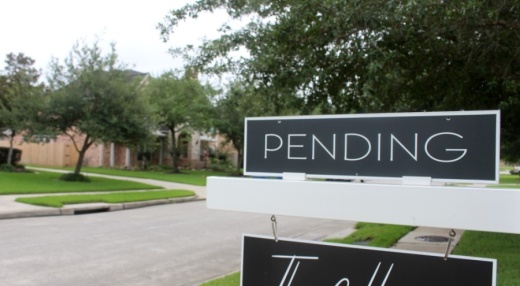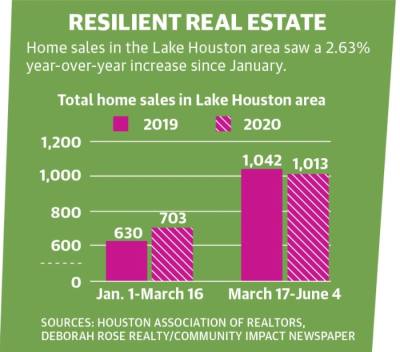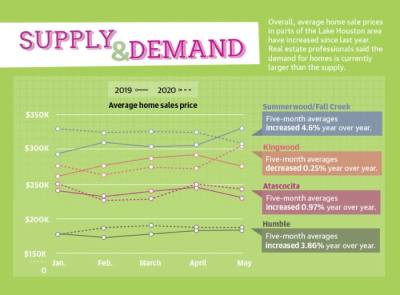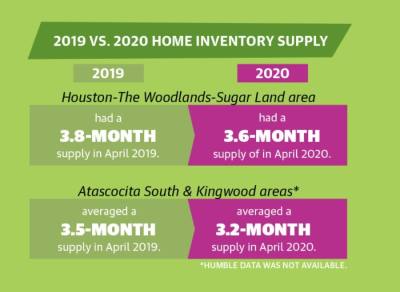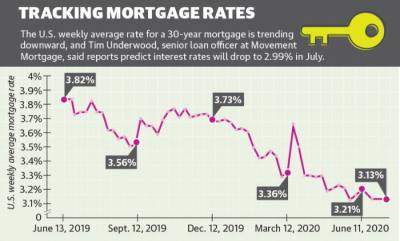Luis Torres, a research economist at the Real Estate Center at Texas A&M University, said the national, state and Houston-area economies, including factors such as job loss, play a role in the Greater Houston area’s real estate market. Torres said single-family home sales in the Houston region fell by 16.8% in April. However, May’s 7.6% drop year over year was not as drastic as April’s, Torres said.
“You can kind of see an improvement, though there is still a drop off,” he said.
While home sales in the Lake Houston area also dipped amid the pandemic, local real estate brokers said they believe the market is promising, as home sales between Jan. 1-June 4 were down almost 5% compared to last year, according to data from the Houston Association of Realtors.
Deborah Rose-Miller, an independent broker agent for her company, Rose Realty, said she believes this dip is encouraging.
“The fact that we only lost 5% is good,” Rose-Miller said. “How high could we have been if we had not had this pandemic?”
Local real estate professionals attributed the steady market to fewer homes on the market, the resiliency and price diversity of the Lake Houston area, and low interest rates.
A resilient market
HAR data shows the Lake Houston area—which comprises Kingwood, Humble, Atascocita, and the combined Fall Creek and Summerwood areas—saw 29 fewer home sales amid the pandemic from March 17-June 4 compared to the same time period in 2019.
However, because the area had 73 more home sales between Jan. 1-March 16 than the same time last year, the Lake Houston area saw a 2.63% increase in home sales year over year between Jan. 1-June 4, per HAR data.
Factors pushing home sales include the area’s proximity to the airport and the plethora of price ranges, Rose-Miller said.
However, not all parts of the Lake Houston area are performing equally. HAR data shows Humble-area home sales declined more than 20% between March 17 and June 4 year over year. Rose-Miller said the decrease is likely due to the lack of newly built homes in the city as well as fewer homes compared to nearby areas.
HAR data shows average home sale prices increased in most areas between March and May. Kingwood, Atascocita, and the Summerwood and Fall Creek communities saw sale prices increase year over year in two out of three months from March to May; Humble’s average home sale price increased all three months.
Interest rates and inventory
Low interest rates and a tight inventory of homes have also helped sustain the real estate market during the coronavirus, said Tim Underwood, senior loan officer at privately owned bank Movement Mortgage.
Underwood said interest rates are lower than they have been in decades, making refinancing a home mortgage or moving to a new home more attractive.
Mortgage rates hit an all-time low in late April at 3.23%, according to weekly data from Freddie Mac, also known as the Federal Home Loan Mortgage Corp. Although interest rates are subject to change quickly, Freddie Mac projected mortgage rates will drop to 2.99% in July, Underwood said.
“I’ve seen ... people take advantage of the lower rates as far as upgrading their existing home,” he said.
Mary Beth Hughes, an independent broker agent for her Kingwood-based company, Platinum Service Realty, said she has seen an increase in business during the coronavirus pandemic due to low interest rates.
With a 4.5% interest rate on a 30-year loan of $225,000, homeowners would pay an estimated $1,748 per month, Hughes said. Meanwhile, a 3.5% interest rate for the same loan is about $1,587 monthly.
“You could buy a bigger house and have a smaller payment; who wouldn’t want that? You get more for less,” she said.
A tight inventory in the Lake Houston area is also contributing to the resiliency, Underwood said.
“Inventory is low, which is what is driving some of the prices up on some of the homes because of the fact there’s much more of demand and not as much supply,” he said.
In May, HAR data shows the Greater Houston area saw its months of inventory—or supply of single-family homes—dip compared to last year, with a 4.1-month supply in May 2019 and a 3.5-month supply in May 2020.
Hughes said she has seen fewer homes on the market this year because people are reluctant to visit homes or have people in their houses, but she believes the supply of homes will rebound by the fall.
“If things open in July, we’ll have record sales in July and August because people like to move while school is out now,” she said.




